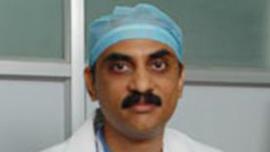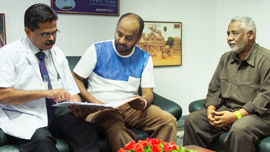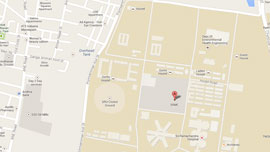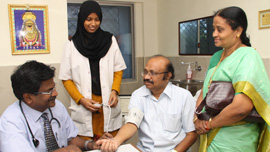The risks in general would be the following. A detailed explanation and counselling would be done by the transplant team
(a) In the immediate postop period - Bleeding, hemodynamic disturbances (hypotension, low cardiac output , hypoperfusion), rhythm disturbances, renal damage.
(b) In the weeks and months after the transplant
Attempts to reject the new heart
Soon after the transplant, the body tries to reject the new heart. The recipient is required to take immunosuppressants to reduce the risk of rejection. Regular check-up is required to monitor how well the transplanted heart is performing .For this, under local anesthesia, a catheter (a fine, hollow tube) with a little cup-shaped biopsy device at the end, is introduced through a vein in the neck and specimen of the heart tissue (biopsy) is retrieved and examined under a microscope
Echocardiogram provides a good guide to monitor the cardiac function.
Infection
Infection is always a cause of concern after transplantation, especially in the first few months. You will have to report to the transplant team any signs of infection and this might require antibiotics . Some antibiotics interact with immunosupressants and in general they should be prescribed by the transplant centre.
(c) In the years after the transplant
As years go by, the risk of acute rejection becomes much less and the doseage of immunosuppressants can be reduced. Your immune system will gradually become more effective again, but you will tend to run a small extra risk of infection. However, one potential complication of long-term immunosuppression is higher risk of certain forms of cancer. About one in ten transplant recipients develops one or the other form of cancer after heart transplant ,most common being skin and lymph gland tumours.
Skin cancer is more common in people with sun-damaged skin and accounts for four out of every ten cancers seen after heart transplantation. As these are superficial it is relatively easy to detect and treat them..
Lymph gland tumors (lymphomas) occur at any stage after a transplant. Some of these tumors shrink when the dose of immunosuppressant drugs is reduced, while others require further treatment like chemotherapy.
Other malignancies like cancer of the lung , bowel, or breast are no more common in heart transplant patients than they are in the general population.
Another long-term side effects of immunosupressants include damage to the kidneys (cyclosporine) or thinning of the bones (osteoporosis) caused by steroids.
Although acute rejection of the new heart is rare after the first three to six months, the body may continue to ‘attack’ the new heart. This is known as ‘chronic rejection’ . The site of the attack is the lining of the coronary arteries carrying blood around the new heart, as this is the ‘frontier’ between the donor and the recipient. The lining of these arteries gradually thickens and eventually the arteries may become blocked. This is rarely seen in the first few years after transplantation but can become a serious problem after five years. The situation is monitored by regular angiography (a test which shows the caliber of the coronary arteries ).
Most patients are treated with aspirin or anticoagulants to reduce the risk of blood clotting. The thickening of the arteries occurs much faster in patients who have high cholesterol levels, so it is important to control your blood cholesterol level .


















